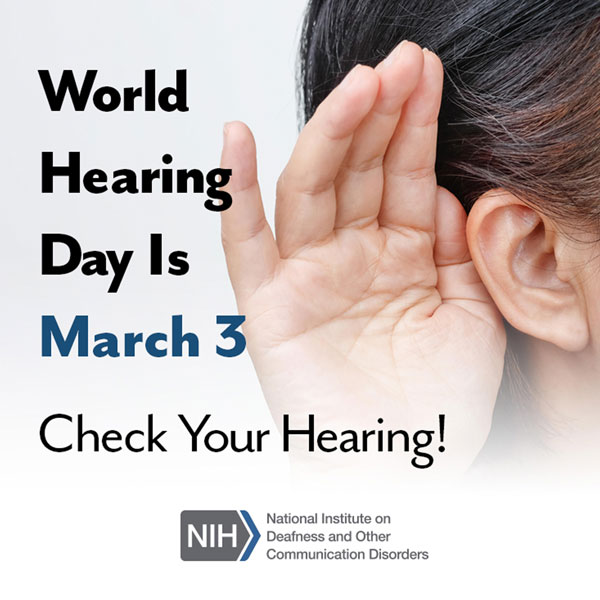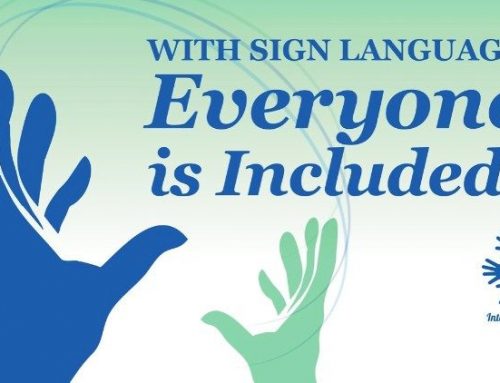World Hearing Day is March 3: Get your hearing checked
February 20, 2019

Click on the image or on this link-sharing page to use our social media sharing tools or embed the image in your website or blog. A Spanish-language version of this image is also available.
Do you enjoy listening to music, going to the movies, and talking to your friends and family? Hearing loss can significantly affect your ability to continue enjoying these and other daily activities. That’s why it’s important to both protect your hearing now and get your hearing checked! On March 3, 2019, during World Hearing Day, the National Institute on Deafness and Other Communication Disorders (NIDCD) joins the World Health Organization (WHO), the Centers for Disease Control and Prevention (CDC), and others to bring attention to the importance of early identification of and intervention for hearing loss.
Approximately 15 percent of American adults ages 18 and over report some trouble hearing. Aging is one common cause of hearing loss. Exposure to loud noise is another—either from exposure to too much noise over time or from a one-time exposure to an intense “impulse” sound, such as an explosion.
Because the damage from noise exposure—called noise-induced hearing loss (NIHL)—is usually gradual, you might not notice it at first, or you might ignore the signs of hearing loss until they become more pronounced. Over time, you might find it difficult to hear or understand conversations, or need to turn up the volume on the television or other electronic devices.
The damage from NIHL, combined with aging, can lead to hearing loss severe enough that you need hearing aids to amplify the sounds around you to help you communicate and participate fully in daily activities. Untreated hearing loss may lead to isolation and has been associated with conditions such as depression, anxiety, low self-esteem, dementia, reduced mobility, and falls.
Exposure to loud sounds can also cause tinnitus—a ringing, buzzing, or roaring sensation in the ears or head. For some people, tinnitus subsides over time; for others, however, tinnitus can continue constantly or occasionally. Tinnitus is sometimes the first sign of hearing loss.
If you or a family member might have hearing loss, talk to a qualified health professional for early and appropriate care. This quick hearing quiz can help you determine if you need to have your hearing tested by a hearing health professional.
What can you do to prevent hearing loss from noise exposure?
- Lower the volume.
- Move away from the noise.
- Wear hearing protectors, such as earplugs or earmuffs.
World Hearing Day Activities
- On World Hearing Day (March 3), WHO will launch a free app—HearWHO—that allows users to check their hearing on their smartphones. Read about the app and WHO’s World Hearing Day campaign(link is external).
- CDC’s National Institute for Occupational Safety and Health (NIOSH), WHO, and many other organizations are sponsoring #Wiki4WorldHearingDay2019(link is external), an initiative to improve Wikipedia content on hearing, hearing health services, hearing testing, and preventive and treatment interventions. You can contribute by suggesting a Wikipedia topic, improving or translating existing articles, or creating new content.
- Raise awareness of healthy hearing with these NIDCD resources:
- Noise-Induced Hearing Loss
- Tinnitus
- Do You Need a Hearing Test?
- Who Can I Turn to for Help with My Hearing Loss?
- It’s a Noisy Planet. Protect Their Hearing.® This public education campaign from the NIDCD teaches preteens and their parents and communities about noise-induced hearing loss.
- How Loud is Too Loud? Bookmark (PDF)








